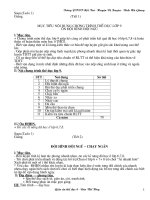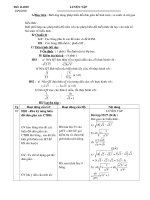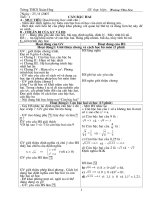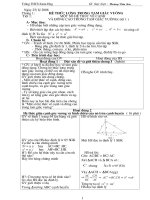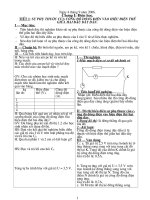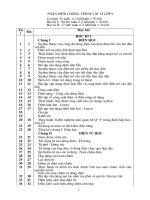Lesson plan English 9 kỳ I
Bạn đang xem bản rút gọn của tài liệu. Xem và tải ngay bản đầy đủ của tài liệu tại đây (321.53 KB, 45 trang )
LESSON PLAN ENGLISH 9
Teacher : Phung Thi Minh Thanh Period : 1
Son Loc Secondary School Date : 24/8/2008
School year : 2008- 2009 26/8/2008
revision
I / Aims
Help ss revise some tense of verbs, passive form, reported speech
II/ Objective:
By the end of the lesson, Ss will be able to remember some tense of
verbs past simple, present perfect tense, passive form, reported speech. :
III/ Teaching aids: workbook.
Procedure
STAGES ACTIVITIES WORK
ARRANGEMENT
Warm up
Revision
“’ Chatting ‘
How are you ?
Do you like your summer vacation ?
What did you do on your summer holiday ?
Where did you go ?
I/ Tense of verbs
1/ Past simple tense.
T – remind ss to remember something about the past
simple tense .
* When to use the past simple tense ?
- Form of verbs ?
( Regular verbs : V-ed , Irregular verbs )
Get ss to remind some irregular verbs :
Do, go, have, buy, see, meet, teach, begin, ….
- Structures of the past simple ?
Ask ss to make some sentences using past simple.
2/ Present perfect tense .
T- remind ss.
- Form ? Have + PP
- The use ?
- Structures?
Ask ss to make some sentences using Present perfect
tense.
T- Wc
T- Wc
Pair work
Pair work
Phung Thi Minh Thanh Grade 9 2008 -2009
1
Home work
Notice : For, Since
Get ss to do exercise IV (p 49 ) in BaitapTiengAnh
II/ Reported speech
Get to tell some thing about the reported speech.
- Statement ?
- Advise ?
Some words must be changed in reported speech
Ask ss to do exercise V(p 36 ) in BaitapTiengAnh
III/ Passive form
Get ss to remember some form of verbs in the
passive form.
- Present simple tense
- Past simple tense.
- With modal verbs
Ask ss to do exercise III(p 104 ) in BaitapTiengAnh
Home work ;
Revive other grammar of English 8.
Prepare for English 9
Pair work
Individual
Individual
LESSON PLAN ENGLISH 9
Phung Thi Minh Thanh Grade 9 2008 -2009
2
Teacher : Phung Thi Minh Thanh Period : 12
Son Loc Secondary School Date : 4/10/2008
School year : 2008- 2009 7/10/2008
Unit 2- Clothing ( 6 periods )
Lesson 6: Language Focus ( p.19- 21)
1. Objective:
By the end of the lesson, Ss will be able to use “ already “ and “ yet “ in the
present
perfect tense, to know clearly the difference between the past simple and
the present perfect tense and be able to use the passive form of the tenses, of
the modal auxiliaries.
2/Teaching aids: Sts' and teacher's book.
II. Procedure:
1.Warm up: Revision: The Present Perfect Tense
T. says: - You have learnt E since 2001 ( asks Ss to use “ for “)
Or - You / We have learnt E for 4 years
1. Perfect tense with "since" and "for" and, recently, How long.. ..( T. elicits
from Ss )
- Since : We use "since" when we say a start of a period
- For : We use "for " when we say a period of time.
Both "Since" and "for", can be used to answer the question:
" How long have/ has + S + past participle.."
- Recently : we use "recently" to indicate an incomplete period of time.
- How long is used when we want to ask a period of time of an action
( Present perfect )
- When is used when we want to ask a start of time of an action. ( past
tense )
2. The difference between the Simple past and the Present perfect.
- The present perfect is used to talk about something which started in the
past and
continue up to the present.
- The simple past is used to talk about something which started in the
past
and finished in the past.
2. Practice:
a. Language Focus 1 ( p. 19 ) :
* Ex1: Substitution table- Language Focus 1:
Ss read the dialogue " in pairs" then make similar dialogues using the
information from the substitution the table P. 20.
- T has some pairs practice their dialogue before the class.
b. Language Focus 2 ( p. 20 ): The present perfect with "already" & "yet"
Phung Thi Minh Thanh Grade 9 2008 -2009
3
* Set the scene: You and your friend are visiting HCM city. Look at the
notes,
there are things you have done, and some things you haven't done. What are
they?
T. asks Ss to look at the dialogue * read in chorus:
Ss- Have you seen Giac Lam Pagoda yet?
Ss- Yes, I have already seen it.
Ss- Have you eaten Vietnamsese food yet?
Ss- No, I haven't
T. elicits from Ss the use and the position of "already" and "yet" in the
sentence.
- "already" is used in affirmative sentences. Position: middle of the
sentence.
- "yet" is used in the negative sentences and questions. Position: end of
the sentence.
* Ex2: Matching and practice the dialogues- Language Focus 2 ( yet
/already)
Ss match the verbs with the words or phrases
See Giac Lam Pagoda Be to Dam Sen Amusement
Park
Visit Reunification Hall Eat Vietnamese food
Be to the zoo and Botanical Gardens
Example exchange: ( in pairs )
You- Have you seen Giac Lam pagoda yet?
S1- Yes, I've already seen it
You- Have you eaten Chinese food?
S1- No, I haven't
You: . ... ... ... .., . .. .. . . . . . .. . . ... ... ... ..? .
S1: .. . . ... ... .. . .,. .. . . .. . . . .. ... ... . .. .. .
c. Language focus 3 ( p. 20- 21 ):
- Ss read the example carefully.
- T elicits and focuses on the difference between the present perfect
tense and
the simple past ( have you seen ...? l When did you see... .?)
- T has Ss read the words in the box P. 20 and find a suitable verb that
can go
with each word.
Example.
a. read a comic b. use a computer c. go to the
supermarket
d. be to the movies e. be to Singapore f. be to Hue
g. play football h. eat durian i. see an elephant
* Ex3: Make the dialogues by playing: Noughts and crosses ( group work )
1- b 2- a 3- e
Phung Thi Minh Thanh Grade 9 2008 -2009
4
4- g 5- d 6- I
7- f 8- c 9- h
Ss make up a similar dialogue with the word given
Example Exchange:
a. S1- Have you ever read a comic? S2- Yes. l have ( No, l
haven't)
S1- When did you last read it? S2- This morning
S1- How was it? S2- It was interesting
d. The Passive Form: Revision
- Ss read the examples given in Language focus 4, 5 P. 21. carefully.
- T uses the example .This exercise must be done carefully to show
Ss how to write passive sentence with some model verbs
like / can / should / might / have / has to / be going to...
Model:
S+ can/ should/ might/ have to / has to/be going to + be +
PP
* Ex5: Practice
- Ss do exercises orally in language focus 4 ( P. 21 ) and language focus
5 ( P. 21
- T has Ss give their answers and does direct correction if necessary.
3. Homework:
1. Rewrite language focus 4, 5 into your notebook.
2. Make the dialogues- language focus 3.
3. learn by heart the notes you've review
English test 45 minutes
Phung Thi Minh Thanh Grade 9 2008 -2009
5
LESSON PLAN ENGLISH 9
Teacher : Phung Thi Minh Thanh Period : 15
Son Loc Secondary School Date : 11/10/2008
School year : 2008- 2009 14/10/2008
Unit 3 : A trip to the countryside
Lesson 1 : Getting started
Listen and read ( p.22- 23 )
I/ Aims
Introduce life and activities in the countryside
II/ Objective:
By the end of the lesson, Ss will be able to talk about life and activities
in the countryside.
III/ Teaching aids: Sts' and teacher's book, pictures.
Procedure
STAGES ACTIVITIES WORK
ARRANGEMENT
Warm up
Presentation
Getting started P. 22
- Ss look at the pictures ,then work with their
partners, take turns to talk about activities in the
countryside. ( Ss speak out )
1. A woman is watering the flowers.
2. Three boys are swimming.
3. A woman is feeding the chickens.
4. Two women are harvesting the rice.
5. A man is feeding the pig.
6. A man is flowing with his buffalo.
7. A boy on the back of the buffalo is
flying his kite.
8. Three boys are playing soccer
- T has Ss give their answers and T should
focus on the present progressive tense.
I. Pre- teach: New words
- T. elicits from Ss to teach the new words
by asking the questions.
+ Who has your home village?
+ How often do you visit your home
village?
+ How do you get there ?
+ What can you see on the way to your
village ?
1. banyan tree (n): c©y ®a ( picture )
2. shrine (n): ®Òn, n¬i thê cóng ( picture )
3. hero (n): (ngêi) anh hïng / nh©n vËt
( example )
4. entrance (n): lèi vµo ( visual )
5. bamboo forest (n): rõng tre (picture )
6. riverbank (n): bê s«ng ( drawing )
* Checking: What and where
Pair work
Individual
T- WC
T- WC
Phung Thi Minh Thanh Grade 9 2008 -2009
6
Practice
Further
Practice
II/ Presentation text:
Listen and read ( P. 22- 23 )
* Set the scene:
Before reading the text about Liz 's trip to
Ba's village. Let Ss read the statements on
P. 23 and predict if they are true or false.
* Ex1: T/ F statements prediction
( Ss work in pairs )
- Ss listen to the tape and read the text in
silence to check their predictions
Answer key:
1.F 2.T 3.F 4.F 5.T 6.F 7.T 8.F 9.T
Correction the false statements: ( orally )
1. Ba and his family had a day trip to
their home village.
3. There is a big old banyan tree at the
entrance to the village.
4. Liz had lunch under the banyan tree.
6. People had a picnic on the river bank.
8. Liz took a lot of photos to show the
trip to her parents.
* Ex2: Comprehension questions ( in pairs )
Ss work with their partners ,
ask and answer the questions.
Ss write the answers in their note books.
T works with weak Ss to give them help.
Ss swap their notebooks with their partners
to help each other correct the mistakes if
necessary.
T has Ss give their answers.
Answer key:
1. Ba's home village is about 100
kilometers to the north of Ha noi. lt lies
near the foot of a mountain and by a
river bank.
2. They got to the village by bus.
3. There is a banyan tree at the entrance
to the village.
4. On the mountain they saw a shrine of a
young Vietnamese hero.
5. They had a picnic on the river bank.
6. Liz took a lot of photos to show the
trip to her parents.
7. She wishes she could visit Ba's village
again some day.
III/ Further Practice
* Ex3: Tell about the trip to Ba's village
- Ss work in pairs , take turns to play the role
of Ba to tell each other about the trip to his
home village.
- T gives some cues to make it easier for Ss to
finish their work,
- T has some Ss practice telling about their trip
Individual
Pair work
Pair work
Phung Thi Minh Thanh Grade 9 2008 -2009
7
Homework
before the class.
+ when to go
+ Who to go with
+ How to go
+ What to do during the trip .
+ How to feel after the trip
*Ss can start their speaking like this :
It was a beautiful day. So I invited Liz to visit
my home town with my family. We got up early and
went there by bus.....
1. learn by heart the new words and write them.
2. Read again ( listen and read p. 22- 23 ) and write
the answers ( - b p. 23 )
3. Retell about Liz's trip to Ba's home village
Pair work
individual
LESSON PLAN ENGLISH 9
Teacher : Phung Thi Minh Thanh Period : 16
Son Loc Secondary School Date : 12/10/2008
School year : 2008- 2009 16/10/2008
Unit 3 : A trip to the countryside
Lesson 2 : Speak and Listen
I/ Aims
Help ss practice asking for giving and listening to specific information
II/ Objective:
By the end of the lesson, Ss will be able to ask and give information about
their own village
III/ Teaching aids: Sts' and teacher's book, pictures. A tape
Procedure
STAGES ACTIVITIES WORK
ARRANGEMENT
Warm up
Brain storming : (Ss work in groups)
Things you can see in the
countryside
Possible answers
- a rice paddy field
- a river flowing across the village
Group work
Phung Thi Minh Thanh Grade 9 2008 -2009
8
Pre-
speaking
While-
speaking
- cattle
- an old house, a cottage...
- a vegetable garden
- a fruit garden
- a banyan tree
SPEAKING
I/Pre- speaking:
- T asks Ss if they are asked to describe their
home village, what they will mention in their
description.
- T elicits the answer from Ss.
( place, distance, transport ….. )
II/ While- speaking:
* Ex1: Mapped dialogue- Speak a.
( P. 34 ) ( Work in pairs )
- Ss work with a partner, read the questions,
then play the role of A and B ask and
answer about their partner's home village
using the information given in the box.
Ss ask and answer about :
Location: Where is your home village
Distance : How far is it from the Hanoi
city?
Transport: How can you get there?
Time to get there : How long does it take to
get there?
Things people often do for a living:
What do people often do for a living?
The sights: Does your village have a river
How are the sights there?
Feelings : How do you think about your
village/ How often do you go there ?
A- Where is your home village?
B- It's to the west of the city and
A- How far is your home village from here?
B- It's 15 kilometres and your village?
A-How do you travel there?
B- I usually go by motorbike
A- How long does it take?
B- An hour.
A-What do the people in your village do for a
living?
B-They plant rice and raise cattle.
A- Is there a river in your village?
B- No, but there is a big lake.
* Ex2: Mapped dialogue- Speak b ( P. 24 )
- Ss work with their partners ask and answer about
their real village.
( Ss use their real information about their real
village. If they don’t have a real village
they can make up the information in box A or B )
- T monitors and gives help.
T- WC
Pair work
Pair work
Pair work
Pair work
Phung Thi Minh Thanh Grade 9 2008 -2009
9
Post-
speaking
Pre-
listening
While-
listening
- T has some pairs to perform their dialogues
before the class.
* Ex3 : Write it up
Ss write about their real home village
- Ss can start their writing like this:
-I was born in the countryside. It's about 145
kilometers from the city I live now. It is
near the sea. So every year I pay several visits to
my home village....
- Hai phong city is my home village. It's about 105
kilometers from Ha Noi... .
a. Pre- teach: New words
1. (a) route (n): tuyÕn ®êng, lé tr×nh
( exp- a way from one place to another )
2. (a) pond (n): ao ( picture / drawing )
3. parking lot = car park:
khu vùc ®Ó xe « t« ( picture )
4. (to) pick somebody up: ®ãn ai
( trans ) > < (to) drop somebody at ( off )
5. Dragon bridge (n): cÇu Hµm Rång
* Checking: R O & R.
b. Set the scene:
Let Ss look at the map ( p. 25 ) You are going to
listen about Ba’s trip to his home
village. Now answer the questions first, then guess
where the place on the map are:
( T asks & Ss answer )
1. Where did Ba and his family go last Sunday? (to
his home village)
2. How did they go? (By bus)
3. What did they see during their trip? ( green
paddy fields, a big old banyan tree, a
shrine, mountains ,rivers...)
* Ex1: Prediction:
- Ss repeat the words (1- 9), T gives any explanation
if necessary.
- Ss read the word again then guess the places on
the map
( One writes the predictions on the board and
others swap their notebooks with
their partners )
* Get Ss to listen to the tape and check and correct
their false predictions.
- Ss share the answers with their partners.
- T has Ss give their answers and elicits from Ss if
necessary.
* Answer key:
1. airport- B 2. Gas station- E
3. Pond- G 4. High way N 1- C
5. Banyan tree- A 6. Store- F
7. Bamboo forest- H 8. Dragon Bridge- D
9. Parking lot- I
Pair work
Pair work
Individual
T-Wc
Individual
Individual
Phung Thi Minh Thanh Grade 9 2008 -2009
10
Post-
listening
Home work
* Ex2: Comprehension questions
- T writes 6 questions on the board. Ss read the
questions carefully then listen to the
tape again to find the answers to the questions. 1.
Where did the bus collect Ba and his family?
( from his house) .
2. Where did it stop to get some more fuel?
(The Gas station)
3. Where did it go after leaving the high way?
( turn left onto a smaller road westward)
4. Where did the bus go next?
(turn right , then turn left onto a road which went
through a bamboo forest)
5. Did the road to Ba's home village go through a
bamboo forest? (Yes)
6. Where did the bus drop everyone?
( at a parking lot near a banyan tree )
• Ex3: Tell about Ba's trip to his home village.
1. Write about your home village
2. Do Exs 5, 6 ( p. 22 ) workbook
Individual
Pair work
Pair work
Group work
Phung Thi Minh Thanh Grade 9 2008 -2009
11
LESSON PLAN ENGLISH 9
Teacher : Phung Thi Minh Thanh Period : 17
Son Loc Secondary School Date : 18/10/2008
School year : 2008- 2009 21/10/2008
Unit 3 : A trip to the countryside
Lesson 3: Read
I/ Aims
Help ss read the text for the details about the country life in the USA
II/ Objective:
By the end of the lesson, Ss will be able to understand a life of an exchange
student and summarize the text about his life in the USA.
III/ Teaching aids: Sts' and teacher's book, pictures. A tape
Procedure
STAGES ACTIVITIES WORK
ARRANGEMENT
Warm up
Pre- reading
While
reading
Brain storming
( Ss think about things people do for their life)
Possible answers:
Grow ( plant) rice, corn, vegetables...
Raise chickens, pigs, cattle... .
Work hard
Busy all year round
Have a hard life
Struggle with nature
I / Pre teach vocabulary
(to ) exchange
Exchange (n) : trao ®æi
Exchange students : trao ®æi du häc sinh
Nearby (adj ); kÕ bªn, l©n cËn
(to) complete : hoµn thµnh
* Set the scene :
Van is a student. He is from Ho Chi Minh City.
Now he is studying in the USA. He is
living with the Parker family on a farm.
*Ask ss to predict the answers for questions
Pre- questions: ( ask and answer )
1. Where is the farm?
2. Does he enjoy his stay there?
Get feedback from ss
* Ask - Ss to read the text and answer the pre-
questions.
Answer key:
1. lt's 100 km outside Columbus, Ohio.
2. Yes, he does.
* Ex1: Matching ( Read a P 26)
- Ss read the text again and guess the
Pair work
T- Wc
T- Wc
Individual
Individual
Phung Thi Minh Thanh Grade 9 2008 -2009
12
Post-
reading
meaning of the word by matching
- T. elicits the answers from Ss and helps
them practice saying the words or phrases.
- ( T adds two more phrases : an exchange
student( du häc sinh ) / feel like )
Answer keys:
A B
Maize Bring things together
An exchange student Shorter and less than
standard time
Feed Where people buy food
and small things
Part –time Corn
Collect Enjoy
Feel like Someone who goes
broad to study and
often has home stay.
Grocery Give food to eat
* Ex2: Gap filling ( Read b P. 26)
- Ss read and complete the summary using
the information from the passage.
- Ss pair compare their answers.
- T elicits the answers from them.
Answer key:
1. .. Ohio , Columbus
2.... ... ...a farmer... .....
3. ....works part time at a big grocery store ..
4....works part time at a big grocery store
5 .. Van ...
6. Sam.. after school
7.....farm on the weekend.
8. ... .watches .,. ...baseball .
9. . ... .member... .
10. ... ... .beginning
- T lets Ss read the text again, try to remember
as many things about the Parker's life as possible.
* Ex3: Answer the questions- Lucky Number
( Ss work in groups )
1 2 3 4 5 6 7 8 9 10
h b c LN g d LN e a f
a. Where is Van now? ( In the USA )
b. Who is he living with? ( With the Parker
family on a farm )
c. Where is the farm? ( 100 km outside
Columbus Ohio )
d. What do Mrs. and Mr. Parker do everyday?
( Mr. Parker grows maize on his farm.
Mrs. Parker works part time at a grocery
store in a town nearby )
e. How many children have they got?
Pair work
Pair work
Individual
Group work
Phung Thi Minh Thanh Grade 9 2008 -2009
13
Homework
( They have got two children . They are
Peter and Sam )
f. What has Van learnt since his arrival ?
( He has learnt a lot about life on a farm
since his arrival )
g. Does he feel like his stay there ? why?
( Yes. Because they are so nice to him )
h. What does he do every?
( He completes his home work, feeds the
chickens and then collects eggs )
1. Learn by heart new words and write them,
2. Read the text many time and write
summary into your notebook
3. Do Exs 4, 10 ( p. 21, 24, 25 ) workbook
Group work
Phung Thi Minh Thanh Grade 9 2008 -2009
14
LESSON PLAN ENGLISH 9
Teacher : Phung Thi Minh Thanh Period : 18
Son Loc Secondary School Date : 20/10/2008
School year : 2008- 2009 23/10/2008
Unit 3 : A trip to the countryside
Lesson 4: WRITE ( P.26,27 )
I/ Aims
Help ss practice writing a passage
II/ Objective:
By the end of the lesson, Ss will be able to use the simple past tense to write a short
passage about " a countryside picnic " basing on the pictures and the information given.
III/ Teaching aids: Sts' and teacher's book, pictures.
PROCEDURE
STAGES ACTIVITIES WORK
ARRANGEMENT
Warm up
Pre- writing
- Revision:
Get ss to Write the simple past and the past participle
of the verbs.
T. has 2 Ss write their answers on the board and
elicits the correction from Ss if necessary.
1. (to) take- took- taken
2. (to) run- ran -run
3. (to) put- put - put
4. (to) catch- caught- caught
5. (to) lay - laid - laid
6. ( to) blow- blew- blown
* Ss do it themselves first , then pair compare,
read in chorus
*Or: Chatting:
( T & Ss or T. elicits the questions from Ss )
1. Have you ever gone on a picnic?
2. When did you go?
3. How did you get there?
4. What did you do there?
5. When did you come back home?
6. How was the picnic?
a. Pre- teach: New words
1. (a) blanket: chăn, mền ( picture )
2. (to) lay out: trải, dọn ( mime )
3. (to) gather: tập trung, thu lợm, thu hái
mùa màng (trans )
4. site (n): địa điểm ( trans ) picnic site:
nơi / địa điểm dã ngoại
* Checking: What and Where
b. Set the scene:
Individual
Pair work
T- WC
T- WC
Phung Thi Minh Thanh Grade 9 2008 -2009
15
While- writing
Post- writing
Homework
T says: -You and your friends had a picnic in
the countryside
- Write a passage entitled “A country trip."
* Ex1: Picture and word cue drill
- T has Ss read the words and ask for any
explanation if necessary.
- Ss look at the words given and the pictures on
page 26, 27, work with their partners to tell about their
trip.
- T monitors and gives help. Then calls some Ss
to talk about their trip before the class
( Maybe, each student for one sentence ) Other
Ss listen and give remarks.
* Ex2: Writing about A countryside picnic
- Ss work in groups of 5 ( one of them is
the secretary to write their groups writing
on a poster )
Models the first sentence and writes on the board:
It was a beautiful day, my friends and I decided to go
on a picnic.
- T monitors , gives help and takes notes of the most
typical mistakes.
Suggested answer:
It was a beautiful day. So my friends and I
decided to go on a picnic. We took a bus to
the countryside and walked about 20 minutes to
the picnic site next to a river.
When we arrived, we put down the blankets and
laid out the food. After meal we
played some games such as "what song is it?.
And “blind man's buff.” Late in the
afternoon we went fishing. We enjoyed the
picnic. The wind blew gently. The air was
so fresh . But when we looked at the time, it
was nearly 6.30. We hurriedly gathered
the things and ran to the bus stop.
We were lucky to catch the last bus and we
arrived home very late in the evening.
* Correction :
- Ss swap their writing to help each other correct
their mistakes. Or the groups hang up
their posters on the board to correct the
mistakes.
- T writes their mistakes on the board and elicits
the correction from Ss if necessary.
1. Practice speaking and writing about your picnic
( Write the passage after correction in your notebook.)
2. Do Ex 9 ( p. 24 )
T-WC
T-WC
Pair work
Individual
Individual
T- Ss
Phung Thi Minh Thanh Grade 9 2008 -2009
16
LESSON PLAN ENGLISH 9
Teacher : Phung Thi Minh Thanh Period : 19
Son Loc Secondary School Date : 24/10/2008
School year : 2008- 2009 28/10/2008
Unit 3 : A trip to the countryside
Lesson 5: Language focus ( P. 28,29 )
I/ Aims
Help ss practice in the past simple with “ WISH “,and practice in prepositions of time
, adverbial clause of result.
II/ Objective:
. By the end of the lesson, Ss will be able to use the simple past with Wish, prepositions
of
time, and adverb clauses of result.
III/ Teaching aids: Sts' and teacher's book, pictures.
PROCEDURE
STAGES ACTIVITIES WORK
ARRANGEMENT
Warm up
Presentation
and practice
“ Chatting”
*- Some questions about the health or the weather
- T. asks Ss to write down two sentences:
+ I ...... ( real situation )
+ I wish ....
Some Ss speak out.
a. Pre- teach: New words
1. (to) pass the exam: > < (to) fail the
exam ( opposite the verbs . )
2. (to) win the contest: ( trans )
3. itinerary (n): h nh tr×nh ( picture )à
4. (to) depart: ( exp- to leave a place,
usually at the beginning of a journey.)
* Checking: What and Where.
b. Activities:
1. Language focus 1- ( P. 28 )
- Modal verb : “could" with "wish"
and the simple past tense with "wish":
T uses these sentences to help Ss revise the use of
"wish"
Model sentences 1.
Ba wishes he could have a new bicycle .
2. They wish they had a villa in Caribbean
* Concept check:
T- Can Ba have a new bicycle now? S1-
No, he can't.
T- Wc
T- WC
T- Ss
Phung Thi Minh Thanh Grade 9 2008 -2009
17
T- What does he wish?
S2- He wishes he could have a new bicycle
T- Do they have a villa in Caribbean now? S3-
No, they don't
T- What do they wish?
S4- They wish they had a villa in Caribbean
T- When do we use " wish + could/ had .
.. .( simple past)?
S5- When we wish something that is not real at
present.
- Ss translate the two sentences into
Vietnamese
* Ex1: Picture and word cue drill.
( Language focus 1- P. 28)
- Ss look at the pictures and read the words
given, then practice their with partners to tell what
the people in the pictures wish.
- T has Ss give their answer and elicits the
correction from Ss if necessary.
Answer keys:
a. Ba wishes he could have a new bicycle.
b. Hoa wishes she could visit her parents
now.
c. I wish I passed the exam.
d. We wish it didn't rain now.
e. He wishes he could fly.
f. They wish they stayed in Hue
*2. Language focus 2 : prepositions of time
(P.30)
- Ss revise prepositions of time,
on, in, at, between, of, after, before, until, till, up,
to
* Ex2: Complete the sentences. Use the
prepositions on the box ( L. F 2, 3- p. 30 )
Ss practice orally
Answer keys :
a. at b. on c. between
d. (2.14 pm) till e. in f . up to
Language focus 3:
Answer keys :
a. on b. at , in c. in
d. for e. in f. at
3. Language Focus 4 ( p. 31 ):
Adverb clauses of result
* Model sentence:
Hoa passed the exam because she worked hard
Hoa worked hard, so she passed the exam.
* Concept check:
- Is so she passed the exam in the
second sentence an adverb clause of result
or of reason? - of result.
T-WC
Pair work
Individual
T- WC
Pair work
Individual
T- WC
Phung Thi Minh Thanh Grade 9 2008 -2009
18
Homework
- T has Ss translate the two sentences into
Vietnamese.
* Ex4: Matching ( L. F 4- P. 31) Ss work in pairs
to do the matching
Answer keys:
1- e 2- a 3- d 4- b 5- c
1. Write Ex1 & Ex4 up
2. Do Exs 1, 2, 3, 7 ( p. 20, 23 )
Pair work
LESSON PLAN ENGLISH 9
Teacher : Phung Thi Minh Thanh Period : 20
Son Loc Secondary School Date : 28/10/2008
School year : 2008- 2009 30/10/2008
Unit 4 : Learning a foreign language
Lesson 1 : Getting started
Listen and read ( p.22- 23 )
I/ Aims
Reading a dialogue for details about the questions in an exam.
II/ Objective:
By the end of the lesson, Ss will be able to understand the content of the dialogue about
examination, to know how to learn foreign language and practice in reported requests,
questions.
III/ Teaching aids: Sts' and teacher's book, pictures. radio
Procedure
Phung Thi Minh Thanh Grade 9 2008 -2009
19
STAGES ACTIVITIES WORK
ARRANGEMENT
Warm up
Presentation
- Brain storming :
Your ways of learning English
- T. gives Ss 2 minutes to think about their ways of
learning English and then write them down.
T. has Ss read the ways of learning English listed on page
32 and compare these ways with theirs.
- T has Ss add what they don't have in their lists.
1. Do the home work.
2. Do more grammar exercises in grammar books.
3. Read stories or newspapers in English.
4. Write E as much as possible.
5. Learn by heart all new words and texts.
6. Speak E with teachers , friends and foreigners.
7. Use a dictionary for reading.
8. Practice listening to E tapes or E programs on the radio
9. Watch E TV programs.
10. Learn to sing E songs.
- Ss read 10 ways of learning English in chorus.
a. Pre-teach: New words
1. aspect (n): lĩnh vực, mặt, khía cạnh ( trans )
2. examiner (n): giám khảo ( exp- a person who asks
questions to find out how much a person know)
3. coming (adj): sắp đến ( trans )
4. college (n): trờng Cao đẳng , Đại học (example )
5. candidate (n): thí sinh ( exp- one who takes part
in an exam )
6. written examination (n): bài / cuộc thi viết (visual) 7.
oral examination (n): cuộc thi vấn đáp, thi nói(exp
* Checking: Slap the board
b. Presentation dialogue:
(Listen and read p. 33)
* Set the scene:
Last week Lan had an oral examination of English. Lan
is talking to Paola about her examination.
- T. asks Ss to answer the pre- questions:
1. Were the questions in oral exam difficult or easy?
2. How many questions did the examiner ask Lan?
* T gets ss feedback
Ask Ss to listen to the dialogue between Lan and
Paola ( p.32-33) and check if their answers are correct or
not.
Answers:
1. They are difficult ( according to Lan )
2. About over 7 questions. Besides, she was
asked to read a passage.
- Ss practice the dialogue in pairs
*Then look at the list of questions to check exactly the
examiner asked her.
Pair work
T- WC
T- WC
Individual
Pair work
Pair work
Individual
Phung Thi Minh Thanh Grade 9 2008 -2009
20
